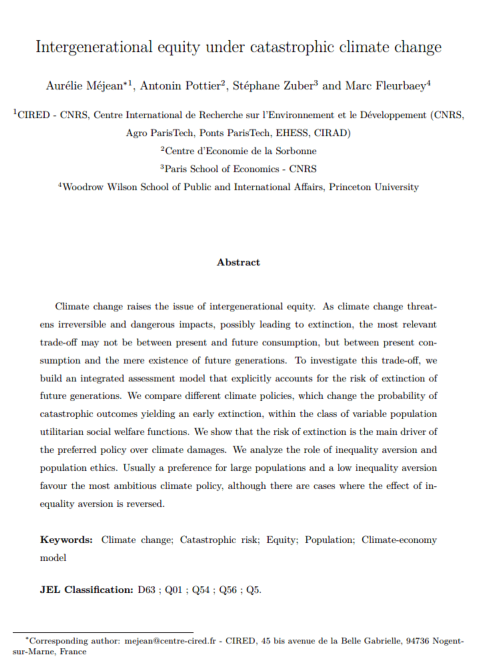Intergenerational equity under catastrophic climate change
Aurélie Méjean (CNRS, Paris), Antonin Pottier (Centre d’Economie de la Sorbonne), Stéphane Zuber (Paris School of Economics - CNRS) and Marc Fleurbaey (Princeton University)
GPI Working Paper No. 5-2020, published in Climatic Change
Climate change raises the issue of intergenerational equity. As climate change threatens irreversible and dangerous impacts, possibly leading to extinction, the most relevant trade-off may not be between present and future consumption, but between present consumption and the mere existence of future generations. To investigate this trade-off, we build an integrated assessment model that explicitly accounts for the risk of extinction of future generations. We compare different climate policies, which change the probability of catastrophic outcomes yielding an early extinction, within the class of variable population utilitarian social welfare functions. We show that the risk of extinction is the main driver of the preferred policy over climate damages. We analyze the role of inequality aversion and population ethics. Usually a preference for large populations and a low inequality aversion favour the most ambitious climate policy, although there are cases where the effect of inequality aversion is reversed.
Other working papers
Existential Risk and Growth – Philip Trammell (Global Priorities Institute and Department of Economics, University of Oxford) and Leopold Aschenbrenner
Technologies may pose existential risks to civilization. Though accelerating technological development may increase the risk of anthropogenic existential catastrophe per period in the short run, two considerations suggest that a sector-neutral acceleration decreases the risk that such a catastrophe ever occurs. First, acceleration decreases the time spent at each technology level. Second, since a richer society is willing to sacrifice more for safety, optimal policy can yield an “existential risk Kuznets curve”; acceleration…
The structure of critical sets – Walter Bossert (University of Montreal), Susumu Cato (University of Tokyo) and Kohei Kamaga (Sophia University)
The purpose of this paper is to address some ambiguities and misunderstandings that appear in previous studies of population ethics. In particular, we examine the structure of intervals that are employed in assessing the value of adding people to an existing population. Our focus is on critical-band utilitarianism and critical-range utilitarianism, which are commonly-used population theories that employ intervals, and we show that some previously assumed equivalences are not true in general. The possible discrepancies can be…
Against Willing Servitude: Autonomy in the Ethics of Advanced Artificial Intelligence – Adam Bales (Global Priorities Institute, University of Oxford)
Some people believe that advanced artificial intelligence systems (AIs) might, in the future, come to have moral status. Further, humans might be tempted to design such AIs that they serve us, carrying out tasks that make our lives better. This raises the question of whether designing AIs with moral status to be willing servants would problematically violate their autonomy. In this paper, I argue that it would in fact do so.

